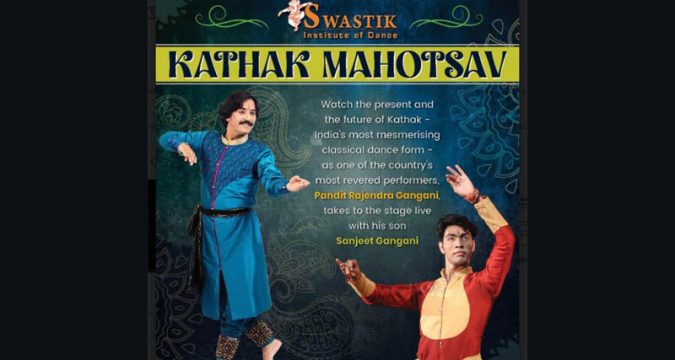
A dazzling dance performance capturing the present and the future of Kathak – one of India’s most revered classical art forms – is coming to Sydney this autumn. Produced by Sydney-based Swastik Institute of Dance, Kathak Mahotsav will star India’s most renowned Kathak performer, Pandit Rajendra Gangani, alongside his son and highly accomplished artist, Sanjeet Gangani. Sumati Lekhi, the artistic director of Swastik, says the show – with live music by musicians from India – will bring together the world-famous father-son duo for the first time on an international stage.
“Pandit Rajendra Gangani and his son, Sanjeet, have performed all over the world,” says Lekhi. “But this year Sydney will become the first place outside of India, where people can witness the father-son duo perform together,” she adds. “It is an exceptional opportunity for people in Sydney – and Australia – to witness first-hand not only the current leading proponent of Kathak, but also the future of this ancient dance form.” Derived from the word “katha”, which in Hindi means “story”, Kathak is renowned for its mesmerising twirls, mathematically precise footwork, vivid expressions and fluid movements. Pandit Rajendra Gangani says, in line with the tradition, this show will depict various stories from Indian mythology.
“One of the most beautiful aspects of Kathak is it tells a story, with graceful gestures and facial expressions, timed perfectly to the beats of the tabla (Indian drums), and Kathak Mahotsav will be no exception,” Pandit Gangani says. “Through this performance we will bring to life some incredible anecdotes from Indian mythology – episodes such as Lord Ram’s visit to Panchvati and Lord Shiva’s appearance as Natraj.”
Pandit Gangani is no stranger to the Harbour City, having performed to a packed Riverside Theatre in Sydney’s Parramatta in 2016. “I have very fond memories of that show. I remember the entire auditorium was filled with people and there was a beautiful energy in the theatre, which is hard to describe,” he says. “When the show ended, the audience erupted with applause. It was overwhelming to see this sort of a reaction in Australia and since then I have been very keen to return.”
For his son Sanjeet, however, this is going to be the first time performing in Sydney. “Sharing the stage with my father is a magical experience. To this day, it leaves me with a mix of emotions – I feel nervous, excited, overwhelmed … all at once,” says Sanjeet. “And while I have performed with him many times in India, and performed on my own all around the world, this is the first time I will be performing with my father outside of India, which makes this show very special for me.” While most children’s first memories are about playgrounds and picnics, Sanjeet’s oldest and fondest memories revolve around Kathak.
“I feel incredibly privileged to have been born in this family, and to have witnessed Kathak – not only by my father but by performers from all over the world – from an incredibly young age.” Sanjeet says there are three phases of learning kathak. The first is “dekhya”, which means to simply observe. The second phase is “seekhya”, which means learning from a guru. And the third phase is “parikhya”, which is to analyse.
“Even though I was born in a Kathak family, I was never asked to follow in the footsteps of my father. I was given the freedom to simply observe and work out the path of my own life for myself,” says Sanjeet, who has performed all over India and in cities such as Rome, Madrid, Shanghai and Bangkok.
For his contribution to the field of Kathak, Pandit Rajendra Gangani received the Sangeet Natak Akademi Award in 2003 from the then president of India APJ Abdul Kalam. The Sangeet Natak Akademi Award is the highest Indian honour given to people in the field of performing arts.
But Pandit Gangani cites something else as the biggest achievement of his life. “Kathak has traditionally been seen as a women’s dance form in India. But art is universal – it should transcend countries, cultures, ethnicities and genders. So for the best part of my life, I have strived to make Kathak an acceptable dance form for all genders,” Pandit Gangani says.
“And I am finally seeing that change take over now, in the form of brilliant male kathak performers taking to the stage – not only in India, but all over the world.” One of the most entertaining features of a live Kathak performance is jugalbandi. “It’s a sort of competition,” says Pandit Gangani. “It can be between the tabla player and the performer … Can the dancer perform as fast as the beats of the tabla player? Or can the tabla player play the drums as fast as the fiercely energetic feet of the Kathak performer,” he adds.
“Sometimes, however, the competition can be between the two dancers … can one dancer match the pace of the other?” And this timeless tradition of jugalbandi will unfold on stage as part of Kathak Mahotsav. “While I have shared all the traditional lessons of Kathak with my son, Sanjeet, every performer imbues this dance form with their own unique personality. And that’s how this timeless art evolves – from one performer to another, from one generation to another.” “And I cannot wait to see how this evolution of Kathak transpires between me and my son at Kathak Mohotsav,” says Pandit Gangani. And neither can Sydney.
ABOUT THE PRODUCER: Swastik Institute of Dance is a Sydney-based performing arts school, specialising in India dance forms, such as Kathak, Bollywood and folk art forms including Bhangra and Giddha. It has two studios in Sydney; in Harris Park and Blacktown. Swastik strives hard to spread the knowledge of traditional Indian dance forms among the Indian diaspora and the larger Australian community; and produces large-scale shows, with strong Indian dance influences, from time to time.
ABOUT THE SHOW: Kathak Mahotsav will be staged at 7pm at Parade Theatre, NIDA (215 Anzac Parade, Kensington, Sydney) on Saturday 6 April. Tickets from $39.
For more info, visit kathakmahotsav.com
For media enquiries, contact Akash Arora on 0430 933 234 or email akash.arora@gmail.com
News: Sumati

























